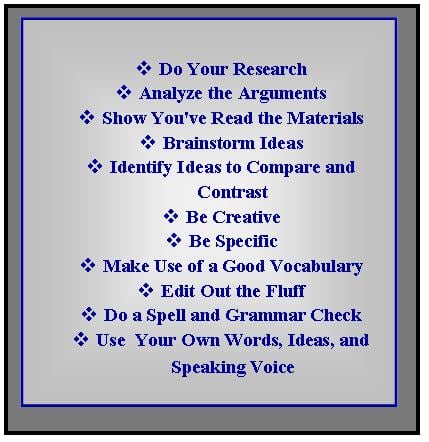How to Write an Essay that Will Impress Teachers

By Joan Whetzel
Every semester, teachers in high schools and colleges ask their students to write essays. The essays will cover every possible topic under the sun. Most will require research, some will be based on reading materials. Whichever form of essay your teacher asks for, there are several techniques to improve your essay writing skills. Use some – or all – of these techniques to create an essay that will impress your teacher.
Do Your Research
For essays that require research, make sure you are using good quality sources of information. If the source is questionable, either don’t use it or make sure you can back up the information from a more reputable source. Teachers may accept a “unique” source (e.g. Dungeons and Dragons website, ghost hunters type websites) if you are using them for a specific reason. Once you’ve done the research and found the best sources for your topic, begin creating your bibliography, in correct format. Also identify a few quotes and statements that can be paraphrased. And create the citations for those quotes and paraphrased statements.
Analyze the Arguments
Whether this is a research essay or an essay based class reading materials, analyze the arguments made in your reading and research. Examine the arguments for truths and for errors. Find opposing arguments that also hold merit. Try arguing both sides of an issue. It helps you determine which side you are leaning toward and why. It also will show the teacher that you’ve thoroughly read the material and understand it.
Brainstorm
Brainstorming is a great technique for any kind of endeavor that requires thinking and creativity. In this case you’ll be brainstorming wording and phrasing ideas, what questions still need answering and further research, places you can find the additional information, metaphors and similes that relate to your topic and the ideas you want to include in the essay, and how your research and reading relates to the teachers lectures and the other materials you’ve read for this class.
Write The First Draft
Okay, now that you’ve got the information you need, and some of your own original ideas that you wish to include in the essay, it’s time to organize the materials and write the rough draft. Simply by reading through your research, and analyzing the arguments, and brainstorming, you brain has probably already started compartmentalizing the information into smaller bite sized pieces. Begin organizing and writing your essay based on those smaller bites. Take your list of metaphors and similes, as well as your list of quotes, and add them in where they seem to fit logically. Then let it rest for a short time. Take a break and come back to it with a fresh mind.
Be specific
Read through the rough draft and begin refining the essay so that it reads better. You’ve got the ideas in place but you need to word them so that the ideas are clear and specific to the class and the teacher’s lectures. In fact, if you use arguments from the teacher’s lectures and the class reading material to back up your statements, that alone will show the teacher that you’ve been paying attention.
Be creative
Creativity means using juicy verbs and nouns, and cutting way back on the adjectives and adverbs. Creativity includes writing an attention grabbing introduction and conclusion and including vivid descriptions of people and events.
Good Vocabulary
Yes, it is a wonderful thing to try on new words and to use them in your school writing. However, using new words works best if you really understand them and you’re certain that you are using them in the right context. If you are not sure, open up a thesaurus and find a suitable synonym that fits your regular speaking style. The truth is, using your own vocabulary may impress the teacher more than using a bunch of big words that you are not completely sure of. If you can use your own “speaking voice” to explain what you’ve read and found out in your research, it shows that you have a good understanding of the material, which is what the teacher is really looking for.
Get Rid of the Fluff
Clearing out the fluff means removing repetitive statements and ideas that don’t support the points you are trying to make. Yeah, some ideas are great and bare repeating, but repeating the same ideas just because you need to meet a minimum word count is not a good idea. For one thing, it shows that you don’t have enough ideas to back up your arguments. For another, it looks like you didn’t take the time to do that little extra research to come up with the few additional ideas to make this a really great essay. Get rid of the fluff and re-read the paper. You’ll see where an extra fact or idea is needed. Then do the research to find that little extra material that’ll impress the teacher.
Spell and Grammar Check
Okay, now you’ve been through a few drafts and it looks like the ideas are flowing well. Time to tweak it with a spell and grammar check. Most word processing programs (like Word for Windows) have a built in spell and grammar check. Use it. Then go through it yourself, reading it carefully. Good as they are, computer spell and grammar checks have their faults. They have been known to overlook words that are spelled right but may be the wrong homonym or may have the wrong nuance. By reading through the essay, you’ll catch a word or phrase here and there that you may need to tweak or adjust to fit your own personal style.
The most impressive essays are the ones where you can draw inspiration from many sources, link ideas with other materials and other people’s ideas, and explain it all in your own words. These are the essays that impress the teachers because they show that you’ve been reading the materials and paying attention. They show that you’ve got a good understanding of the material.




